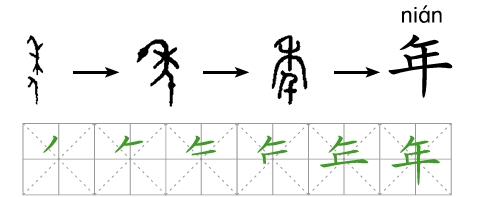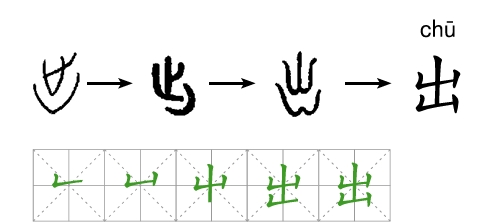练习 Exercises
1 分角色朗读课文 Role-play the dialogues.
2 根据课文内容回答问题 Answer the questions based on the dialogues.
- 她们是什么时候认识的?Tāmen shì shénme shíhou rènshi de?
- 她们是在哪儿认识的?Tāmen shì zài nǎr rènshi de?
- 他们是怎么去饭店的?Tāmen shì zěnme qù fàndiàn de?
- 李先生是坐出租车去饭店的吗?Lǐ xiānsheng shì zuò chūzūchē qù fàndiàn de ma?
- 李小姐是怎么来北京的?Lǐ xiǎojiě shì zěnme lái Běijīng de?
3 用本课新学的语言点和词语描述图片
Describe the pictures using the newly-learned language points and words.

Wǒmen shì zài Bālí de.
我们 是在巴黎 (Paris) ________的。

Wǒ méi kànjiàn Lǐ lǎoshī, tā shì shénme shíhou ________?
我 没 看见 李老师,她 是 什么 时候________?

Zhèxiē yīfu bù jīntiān de, shì zuótiān mǎi de.
这些 衣服不________今天________的,是 昨天 买 的。

Wǒmen shì yìqǐ lái de, wǒ bù xǐhuan zuò chūzūchē.
我们 是一起________来的,我 不 喜欢 坐 出租车。
汉字 Characters
1 认识独体字 Single-Component Characters
(1)“年”,本义是将收成的谷物运回家。现在是时间单位。
“年” originally meant “to carry crops home”. Now it means “year”.

(2)“出”,字形像脚离开某地。现在是从里面到外面的意思。
“出” originally referred to the germination and growth of a plant. Now it means “to come or go from inside to outside”.

(3)“飞”
本义是鸟类或虫类等用翅膀在空中往来活动,现在泛指在天上飞、快等。
Originally “飞” meant the activity of a bird or an insect flying in the sky with its wings, and now it generally means “to fly in the sky” or “being quick”.

2 汉字偏旁 “艹” 和 “宀” Chinese Radicals: “艹” and “宀”
| 偏旁 Radical |
解释 Explanation |
例字 Example Characters |
|---|---|---|
| 艹 | 草字头,一般和草木或者植物有关系。 The radical “艹” is usually related to grass, trees or plants. |
茶 chá tea 菜 cài vegetable |
| 宀 | 宝盖头,一般和房子有关系。 The radical “宀” is usually related to houses. |
安 ān to settle 家 jiā home |
运用 1 双人活动 Pair Work
两人一组,选择对方的一样物品,询问具体购买情况。
Work in pairs and ask each other about where and when something was bought.
例如:A: Zhège shì zài nǎr mǎi de?
这个 是 在哪儿 买 的?
B: Zài shāngdiàn mǎi de.
在 商店 买 的。
A: Shénme shíhou mǎi de?
什么 时候 买 的?
B: Zuótiān mǎi de.
昨天 买 的。
Hànyǔ shū yīfu bēizi diànnǎo
汉语 书 衣服 杯子 电脑
3 – 4人一组,互相询问并记录小组各成员会做什么,每组请一位同学报告情况。
Work in groups of 3 – 4. Ask about the ability of each of your group members and take notes.
Each group chooses one member to make a report.
Nǐ huì shuō Hànyǔ ma?
例如:A:你 会 说 汉语 吗?
Huì.
B: 会。
Nǐ shì shénme shíhou kāishǐ xué Hànyǔ de?
A:你 是 什么 时候 开始 (to start) 学 汉语 的?
Wǒ shì …… de.
B: 我 是……的。
Nǐ shì zài nǎr xué de?
A:你 是 在 哪儿 学 的?
Wǒ shì …… de.
B: 我 是……的。
| 姓名 Name | 会做什么 Ability | 时间 Time | 地方 Place | |
|---|---|---|---|---|
| 1 | 小王 Xiǎo Wáng | 做中国菜 zuò Zhōngguó cài | 今年 jīnnián | 北京 Běijīng |
| 2 | ||||
| 3 | ||||
| 4 |

Comments